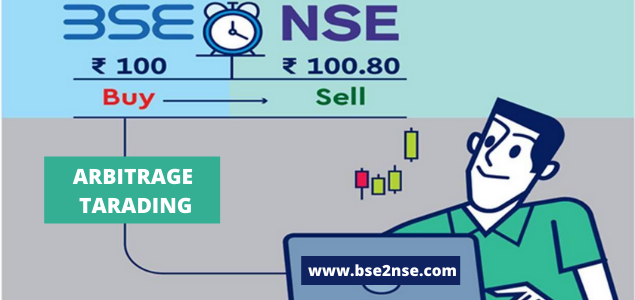Equity / Stocks - What is Arbitrage Trading and How Does it Work in MARKETS - What is Arbitrage?
Arbitrage can be defined as the simultaneous buying and selling of the same asset in different markets ...
-
09-02-2021 05:50 PM

What is Arbitrage Trading and How Does it Work

What is Arbitrage?
Arbitrage can be defined as the simultaneous buying and selling of the same asset in different markets to gain from the difference in price in both the markets. While arbitrage opportunity can arise in any asset class that is traded in different markets in a standardized form, it is more common in currency and stock markets. Arbitrage opportunities are often short-lived, lasting only a few seconds or minutes. Contrary to popular economic beliefs, markets are not completely efficient, which gives rise to arbitrage opportunities. The price of an asset is a result of the demand and supply in the market. Due to a discrepancy in supply and demand of an asset in different markets, a difference in price arises, which can be utilised for arbitrage trading.
How does arbitrage trading work?
Arbitrage trading is dependent on the ability of the trader to capitalise on the price differential of the same asset in different markets. Since arbitrage opportunities are very short, most traders use computers to conduct arbitrage trades. Another important factor to take into account is the transaction charges. If the transaction cost exceeds the price differential, then it eliminates arbitrage opportunity.
India has two major exchangesóBSE and NSEóand a majority of companies are listed on both the exchanges, creating a potential for arbitrage. Even if there is a difference in the price of a particular share on the NSE and BSE, one cannot simply do arbitrage trade. Traders are not allowed to buy and sell the same stock on different exchanges on the same day. For instance, if you buy the shares of XYZ on NSE today, it cannot be sold on the BSE on the same day. Then how does arbitrage work? One can sell shares that he/she already has in the DP on an exchange and buy the same amount from a different exchange. For example, if you already have the shares of XYZ, you can sell them on BSE and buy it from the NSE. If you already have the stock, it is not an intraday trade on different exchanges.
Arbitrage trade between Exchanges
Letís take an example. Assume MRF is trading on NSE at 77500 and 77450 at BSE. One can do arbitrage trade by buying MRF on BSE at 77450 and selling on NSE at 77500. When the price difference falls below 50, one can just square off the positions. If the difference between NSE/BSE price is less than 50, there will profit. One also need to be aware of the spread before taking such trades.
This is an arbitrage trade because it doesnít matter if MRF goes up or down, only thing that matters is the price difference of MRF on NSE and BSE.
Arbitrage trade between Segments
Everyone is aware that by expiry, both spot and future price converges. But at the start of expiry, future generally trades at a premium. IEX spot price is 566.60 while IEX Sep Fut price is 568.4 (on 2-Sep-2021). Lot size is 1250. So one can just buy 1250 quantity in cash market for 566.60 and sell 1 lot of futures at 568.40. Difference of 1.80 * 1250 (2250) will be profit at end of expiry as this difference will become zero.
Conclusion
This seems to be risk free and one may wonder why not everyone is doing it. To buy 1250 in cash segment at 566.60, one would need 7,08,250. To sell one lot of futures at 568.40, one would need 1,80,000 as margin. Due to compulsory physical settlement, margins will double in last week. So one would need around 10L. So the ROI is just 0.22% a month. This is not considering transaction costs and spill over due to bid/ask spread. If one were to consider these as well, then ROI may even fall to 0.1%. Is it worth doing this? No, not at all. One will get much better returns even in FD without any hassle.
Though it is easy to spot an arbitrage opportunity, manually profiting from them is very difficult and most just donít do it.

-
08-02-2022 04:22 PM
Arbitrage trading works due to price difference in the same stock in the spot market and the future market. The difference allows the trader to pocket a small gain with minimal risk and this is how the trade works.
Visitors found this page by searching for:
Tags for this Thread






 Register To Reply
Register To Reply
